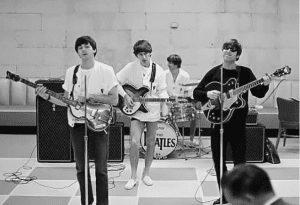Metallica’s Lars Ulrich: “I Work Harder Now to Keep Up With the Young Guns”

via Dutch Generation X / YouTube
Lars Ulrich has spent more than four decades behind the drum kit for Metallica, but he’s not slowing down. At a recent screening of the documentary Metallica Saved My Life at the Mill Valley Film Festival, he shared candid insights about aging, fitness, and keeping up with younger musicians in an ever-evolving rock landscape. His comments highlighted both gratitude for longevity and the discipline required to maintain his drumming at a high level.
Speaking to fans after the screening, Ulrich reflected on how much harder he works today compared to his younger years. He likened his approach to athletics, referencing his upbringing around tennis and the mindset that athletes peak early. But unlike sports, rock music doesn’t have divisions or age brackets, meaning he’s competing on the same stage as musicians decades younger.
For Ulrich, staying relevant and physically capable means adapting his lifestyle—diet, exercise, injury prevention, and consistent conditioning. The idea that rock musicians can keep performing into their sixties and seventies was once unthinkable, but he insists it’s now a reality that demands commitment. His remarks offered a rare glimpse into the discipline behind Metallica’s continued dominance on the world stage.
https://twitter.com/TheMetalliHat/status/1607370467496583168
Competing in an Ageless Rock Arena
Ulrich explained that his drumming stamina and speed aren’t the product of natural acceleration with age, but the result of adjusting his lifestyle. He emphasized that rock and roll is unique compared to athletics—there’s no “senior circuit” shielding older performers from younger competition. Onstage, it’s one big arena where musicians of all ages perform under the same expectations.
Growing up around tennis, he always assumed physical performance followed a predictable trajectory: players peak young and decline by their thirties. That mindset clashed with the reality of touring with Metallica into his sixties. Rather than accepting decline, he focused on being physically prepared to match the intensity of younger bands.
To do that, Ulrich committed to fitness, weight management, and preventive care. He acknowledged having “less of him” these days, joking that lifestyle changes—and cutting down on fast-food habits—lightened his feet. Injury prevention has also become essential, with the band traveling alongside staff who specialize in maintaining their physical condition on long tours.
https://twitter.com/BoredWeb3/status/1316156512511893505
Defying Early Rock Expectations
Ulrich noted how dramatically expectations for aging rock musicians have changed. When Metallica started, performers in their thirties were considered elder statesmen. He recalled that at the time, seeing artists in their fifties or sixties actively touring was almost unheard of.
He referenced Paul McCartney and Mick Jagger as examples of musicians who shattered the old narrative. Their careers proved longevity was possible, rewriting assumptions about what rock performers could achieve as they age. This shift gave Ulrich and countless others the chance to build long-lasting careers that weren’t considered viable decades earlier.
Still, performing at that age requires effort. Ulrich stressed that staying both functional and relevant into his seventies means remaining disciplined. With hopes of continuing for another decade or two, he believes older rock musicians must be more mindful of how they treat their bodies and approach the demands of live performance.
Moving Past Criticism and Insecurity
Beyond physical maintenance, Ulrich also reflected on the emotional and psychological evolution of his career. He openly admitted he no longer bothers reading comments, reviews, or criticisms—something that once consumed him. In the early years, he and his bandmates were hyperaware of public perception, combing through magazines to see what others thought.
That mindset changed drastically. Ulrich said he now avoids most interviews and fan commentary, occasionally checking “trolling sections” for amusement rather than insecurity. Negative opinions don’t weigh him down anymore, especially compared to twenty years ago when a single critical comment could bother him.
He also looked back on his insecurities from the mid-1980s, especially during the …And Justice for All era. Competing with drummers like Dave Lombardo and Charlie Benante pushed him to overextend. Eventually, he realized he didn’t need to prove anything through technical flash but instead focus on serving Metallica’s songs—something he believes he excels at better than anyone.
Practice, Discipline, and Staying in Shape
Although many assume he practices regularly to improve his technique, Ulrich admitted that his routine isn’t tied to technical drills. Instead, he plays primarily to stay in shape and maintain familiarity with performance flow. When the band takes extended breaks, he sits behind the kit and experiments, playing along to different tracks to stay sharp.
He doesn’t focus on complex exercises or advanced rudiments. For him, drumming has always been more about feel and interpretation rather than technical virtuosity. He’s the first to admit he’s not a “paradiddle-standing-on-his-head” type of drummer—and he doesn’t try to be.
What matters most to him is staying physically conditioned through running, healthy eating, and regular movement. His drumming endurance depends more on overall fitness than hours of stick drills. This blend of discipline and self-awareness helps him maintain performance quality even as the years add up.











